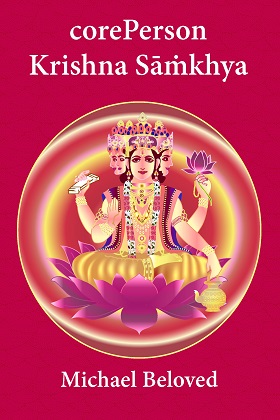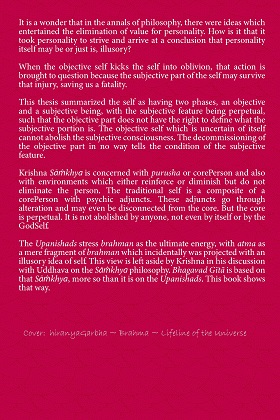

Publication Data
Publisher: Michael Beloved
Date: October13, 2022
ISBN Print: 9781942887539
ISBN eBook: 9781942887546
LCCN: 2022912941
Pages: 310
Illustrations: 16
Trim Size: 6 x 9 inches
Language: English
Category: Body, Mind & Spirit / Meditation
Book Vendors
Bookwire/Bowker ISBN Agency (SEO): Paperback / eBook
Paperback
|
Amazon |
eBooks
| Kindle | |
| Nook | USA |
| Kobo | Global |
| iTunes | Global |
Email:
Forum: inSelf Yoga
Description:
This rendition of Krishna Sāṁkhya takes into consideration the person, purusha. It pushes away the generic self or atma, which was broadcasted in the Upanishads as being related to the brahman infinite energy.
Even though much of the Bhagavad Gita corresponds with the philosophy of the Upanishads, the Gita struct out with fresh concepts and arguments as explained by Krishna to Arjuna. Later however in the discourse with Uddhava, Krishna delved into his Sāṁkhya.
Uddhava Gita and Bhagavad Gita are rendered here with stress on the person. The first part of this book considers the traditional person which is a composite and the corePerson which is part of the composite. The subjective and objective states of the self are related.
Back Cover:
It is a wonder that in the annals of philosophy, there were ideas which entertain the elimination of value for personality. How is it that it took personality to strive and arrive at a conclusion that personality itself may be or just is, illusory?
When the objective self kicks the self into oblivion, that action is brought to question because the subjective part of the self may survive that injury, saving us a fatality.
This thesis summarized the self as having two phases, an objective and a subjective being, with the subjective feature being perpetual, such that the objective part does not have the right to define what the subjective part is. The objective self which is uncertain of itself cannot abolish the subjective consciousness. The decommissioning of the objective part in no way tells the condition of the subjective feature.
Krishna Saṁkhyā is concerned with purusha or corePerson and also with environments which either reinforce or diminish but not eliminate the person. The traditional self is a composite of a corePerson with psychic adjuncts. These adjuncts go through alteration and may even be disconnected from the core. But the core is perpetual. It is not abolished by anyone, not even by itself or by the GodSelf.
Author's Comment:
At last, clarification about Krishna Saṁkhyā!
Will the Upanishads please stand aside.
